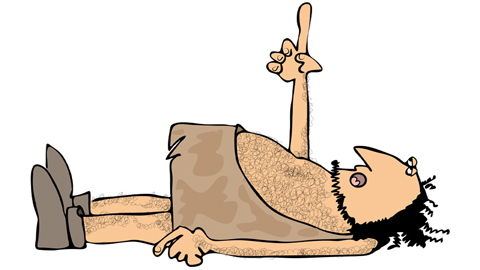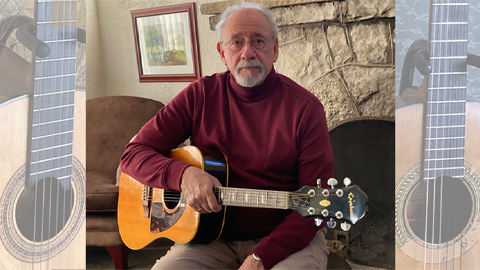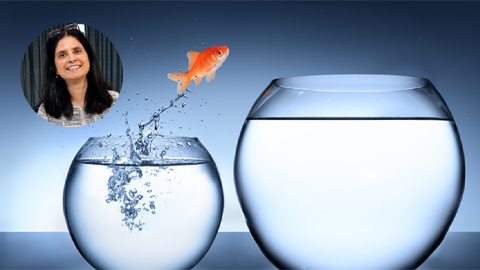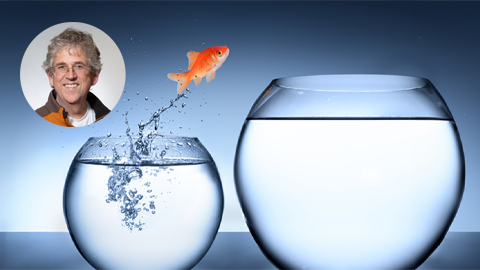Life on social media
in and out of academia

“@Inkfish …you had me at ‘robotic rectum.’”
I wrote the tweet above over my lunch, giggling silently to myself. It was in response to a new tactile robotic device designed to help doctors train for prostate exams. The phrase “robotic rectum” was just too good to pass up.
But before I hit “tweet,” I paused. Smirking over a robotic posterior was fun when I was a postdoctoral fellow writing under a pen name. Now I’m a professional science writer at a respected magazine. Should I really be laughing about robotic nether regions on the internet?
I sent it anyway.
But my brief pause was an important one. It’s one that I have kept up rigorously throughout my time on the internet. During my time on social media, I have transitioned from a graduate student to a postdoctoral fellow and then to professional writer. I have written under a pseudonym and under my real name. Over time, the internet has changed. So have I. But my rules for posting have remained the same. There are only two.
Know your audience
When I started out on social media as a graduate student, my audience was primarily other scientists, other science bloggers and science-interested people. Accordingly, I could post inside jokes and stories and write personal things about life inside the ivory tower.
Five years and a career change later, the science-interested people vastly outnumber the other two groups. They like to hear about life in science, but they also want fun, interesting links to science stories they can trust. Robotic nether regions are still entertaining and interesting to this group.
I also now run the social media feeds for “Science News for Students,” sending out links to our latest stories and interacting with readers. That job requires the same talent for making links fun and interesting. But that audience is primarily teachers, parents and students. A robot prostate will not fly. My “voice” on social media there is more professional and impersonal.
As a postdoctoral fellow, I used social media sites, such as Twitter, for networking and making personal connections. But as a professional science writer, my focus has shifted. This is partially because Twitter itself has shifted. Science writers tend to use it less personally than in the past. Networking has shifted to private groups on Facebook or to one-on-one direct message conversations. Over time, I have followed the networking from platform to platform to find the connections that fit my needs.
Everyone starts on social media for a different purpose. If you want to network and meet people, that’s your “audience.” If you want to share your work, your audience may be different. Knowing who your audience is helps determine what you want to share. But how you share it? That’s rule number two.

The cocktail party rule
Any one individual’s reach on Twitter, Facebook or other social media platform may be small. But social media is never truly private. Tweets are usually public, Facebook posts often can be shared and even Snapchats can be screenshotted and preserved. The internet is forever.
So before you write that dirty, snarky or slightly mean post, pause. Would you say that at a cocktail party? A big one? One with both children and people over 65? Would you be willing to go back, five years from now, view that post again, and own it?
This doesn’t mean everything you post needs to be a momentous statement. But it’s worth keeping in mind that your Facebook wall isn’t as intimate as it might seem. Bad-mouthing colleagues behind thinly veiled code names may seem satisfying, but people aren’t stupid. The brief satisfaction of a well-flung internet barb may not be worth the future blowback.
Social media works best for building connections, not burning bridges. It never hurts to be polite. Text comes without tone of voice or context. Don’t automatically assume the tone is angry or sarcastic.
As I transitioned from working in academia to a nonprofit organization, that sense of caution only has increased. I’m glad to chat and joke, but I’m always mindful that this is not just my personal social media account anymore. This is part of my job. Some of my tweets represent an organization. Even my personal Tweets can reflect on my employer and my colleagues. To be on social media is to be in the public eye.
This shouldn’t induce paralysis. It’s just a reminder that social media is a public space. Behave accordingly. Be wry, funny, smart and informative. Be yourself. But be an adult.
Or at least be an adult most of the time. Looking back on that tweet about robotic prostate exams from a comfortable day’s distance, I don’t regret it. I spread the word about a neat piece of technology. And “robotic rectum”? It’s still funny.
Enjoy reading ASBMB Today?
Become a member to receive the print edition monthly and the digital edition weekly.
Learn moreGet the latest from ASBMB Today
Enter your email address, and we’ll send you a weekly email with recent articles, interviews and more.
Latest in Opinions
Opinions highlights or most popular articles

A paleolithic peer review
You might think review panels have only been around for the last century or so. You would be mistaken.

Early COVID-19 research is riddled with poor methods and low-quality results
The pandemic worsened, but didn’t create, this problem for science.

So, you went to a conference. Now what?
Once you return to normal lab life, how can you make use of everything you learned?

My guitar companion
A scientist takes a musical journey through time and around the world.

Catalyzing change and redefining purpose
To mark Women’s History Month, Sudha Sharma writes about her journey from focusing on her own research program to being part of a collaborative COVID-19 project.

The power of sabbaticals
To mark Women’s History Month, Nicholas Rhind writes about learning techniques in other researchers’ labs that empower the work in his own.

